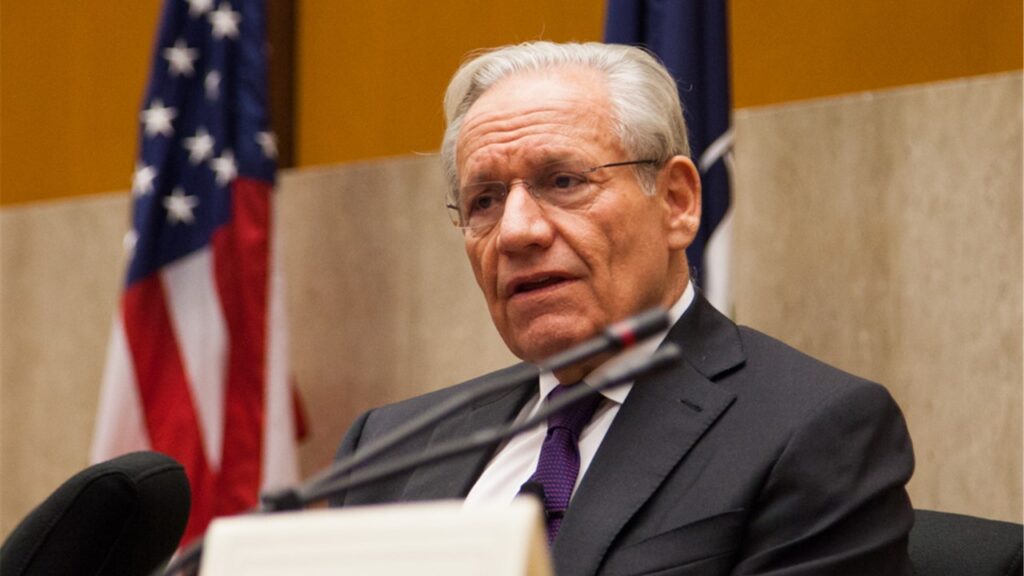
Bob Woodward participates in the State Department’s Edward R. Murrow Program for Journalists on November 2, 2016. Photo courtesy of the US State Department’s Bureau of Educational & Cultural Affairs.
A Lack of Curiosity Amid a $100 Million Loss
The NYT reports that Jeff Bezos’s Washington Post is on a pace to lose $100 million, and the WSJ reports a loss of half-a-million subscribers since Biden took office. Adding to the drama, the Post is closing its weekly Sunday magazine, whose ten staff members are eligible for taking severance but aren’t eligible to apply for other jobs in the newsroom.
How could a leading newspaper lose $100 million? As Mark Judge explains in the Spectator, one certain cause is a lack of curiosity, which seemingly stems from a strong rush by the newspaper to push the Post’s narrative.
The Post always has been a liberal newspaper. Of late, however, it has seemed to be indifferent to journalism.
Earlier this year, veteran Post reporter Bob Woodward, who … became famous for his Watergate coverage, blasted the media and the young reporters at his own paper for their falling for “Russiagate,” the hoax that President Donald Trump was working with the Russians. Woodward called the Steele dossier, the basis for that story, garbage, and told the Columbia Journalism Review that the media had to “walk down the painful road of introspection.”
From Bob Woodward, Veteran Post Reporter:
“To be honest, there was a lack of curiosity on the part of the people at the Post about what I had said, why I said this, and I accepted that and I didn’t force it on anyone.”
Corruption of the Media
Mark Judge, author of “The Devil’s Triangle,” writes of his own experience with the Post. In “The Devil’s Triangle,” he covers the corruption of the media itself. Judge recounts how Emma Brown emailed him on the morning of 16 September. 2018 – the day she broke the Ford story in the Washington Post.
On September 16, 2018, Washington Post writer Emma Brown reported that Christine Blasey Ford, a psychologist in California, accused Brett Kavanaugh of sexual assault. Kavanaugh had been nominated for the Supreme Court and was about to be voted out of committee. Ford claimed that he had sexually assaulted her in high school in 1982.
Brown emailed me (Judge) to ask about the allegation; however, the information she asked me to respond to was different from what was published in her Washington Post article. In her email to me, which was leaked to the media, Brown referenced a girl named Leland Keyser, who was allegedly at the party that Ford, Brett (Kavanaugh) and I also supposedly attended.
The New American Stassi
The Washington Post piece was published hours later, without any mention of Leland Keyser.
At the Wall Street Journal, Kimberly Strassel noticed this. She asked: why is there no mention of Leland Keyser in the official Post piece? Why didn’t Post reporter Emma Brown mention Keyser, who according to Ford was at the party in question?
It’s not hard to see why, explains Judge.
Keyser, it turns out, was a disaster for Ford’s credibility. In 2019 Keyser revealed to Robin Pogrebin and Kate Kelly, two reporters for the New York Times, that she did not believe Ford’s story. Further, Keyser said she felt threatened to change her story. “We spoke multiple times to Keyser, who also said that she didn’t recall that get-together or any others like it,” Pogrebin and Kelly reported. “In fact, she challenged Ford’s accuracy. ‘I don’t have any confidence in the story.’”
Ms. Strassel twittered:
“Wow. Ford said Leland Keyser wouldn’t remember the party, and Brown just decided to believe her and not mention Keyser at all.”
A Lack of Curiosity vs Introspection
Bob Woodward blasted the media and the young reporters at his own paper for their falling for “Russiagate,” the hoax that President Donald Trump was working with the Russians.
Woodward called the Steele dossier, the basis for that story, garbage, and told the Columbia Journalism Review that the media had to “walk down the painful road of introspection. To be honest, there was a lack of curiosity on the part of the people at the Post about what I had said, why I said this, and I accepted that and I didn’t force it on anyone.”
One critic reviewed Judge’s book as a “frank, confessional, and deeply moving book that stands comparison to Arthur Koestler’s Cold War classic Darkness at Noon. Judge rips the mask from the new American Stasi. Using pop culture, politics, the story of his friendship with Kavanaugh, and the fun, wild, and misunderstood 1980s, Judge celebrates sex, art, and freedom while issuing a timely warning to the rest of us about our own endangered freedoms.”
If you’re willing to fight for Main Street America, click here to sign up for the Richardcyoung.com free weekly email.





